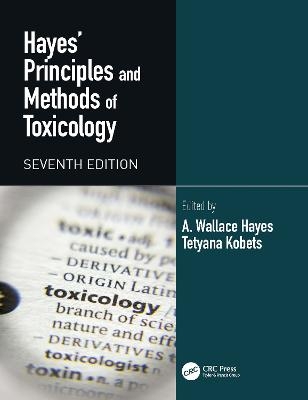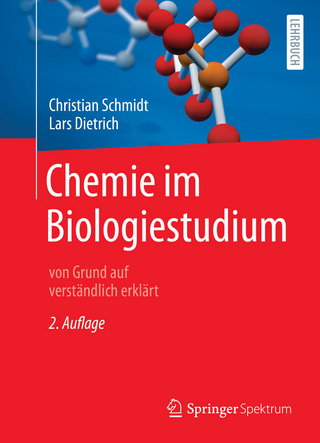
Hayes' Principles and Methods of Toxicology
CRC Press (Verlag)
978-0-367-61154-5 (ISBN)
Hayes’ Principles and Methods of Toxicology has long been established as a reliable and informative reference for the concepts, methodologies, and assessments integral to toxicology. The new edition contains updated and new chapters with the addition of new authors while maintaining the same high standards that have made this book a benchmark resource in the field.
Key Features:
The comprehensive yet concise coverage of various aspects of fundamental and applied toxicology makes this book a valuable resource for educators, students, and professionals.
Questions provided at the end of each chapter allow readers to test their knowledge and understanding of the material covered.
All chapters have been updated and over 60 new authors have been added to reflect the dynamic nature of toxicological sciences
New topics in this edition include Safety Assessment of Cosmetics and Personal Care Products, The Importance of the Dose/Rate Response, Novel Approaches and Alternative Models, Epigenetic Toxicology, and an Expanded Glossary.
The volume is divided into 4 major sections, addressing fundamental principles of toxicology (Section I. "Principles of Toxicology"), major classes of established chemical hazards (Section II. "Agents"), current methods used for the assessment of various endpoints indicative of chemical toxicity (Section III. "Methods"), as well as toxicology of specific target systems and organs (Section IV. "Organ- and System-Specific Toxicology").
This volume will be a valuable tool for the audience that wishes to broaden their understanding of hazards and mechanisms of toxicity and to stay on top of the emerging methods and concepts of the rapidly advancing field of toxicology and risk assessment.
Dr. A. Wallace Hayes, a toxicologist with experience in industry and academics, has held professorships at the University of Alabama, University of Mississippi Medical Center, Wake Forest University School of Medicine, and Visiting Scientist at Harvard T. H. Chan School of Public Health and is currently an adjunct professor at the University of South Florida College of Public Health and Michigan State University Institute for Integrative Toxicology. He has 365 plus peer-reviewed publications. He is the editor for the Americas, Human and Experimental Toxicology, the editor-in-chief for Cutaneous and Ocular Toxicology, Toxicology Research and Application, and co-editor of the Target Organ Toxicity Book Series. He is the co-author of the Loomis’ Essentials of Toxicology. Dr. Hayes is a past Secretary-General of IUTOX (two terms), past treasurer of the American Board of Toxicology, past president of the American College of Toxicology, the Toxicology Education Foundation, the Academy of Toxicological Sciences, and the Toxicology Forum, and past councilor of the Society of Toxicology. Dr. Hayes is a diplomate of the American Board of Toxicology, the Academy of Toxicological Sciences, the American Board of Forensic Medicine, and the American Board of Forensic Examiners. He is a Fellow of the Academy of Toxicological Sciences, the Royal Society of Biology (UK), the Royal Society of Medicine (UK), the American College of Forensic Examiners Institute, and the American College of Nutrition. Dr. Hayes is a registered toxicologist in the European Union and a certified nutrition specialist (food safety). Dr. Hayes was honored by the Society of Toxicology in 2006 with the Society's Merit Award, by the Mid-Atlantic Society of Toxicology with its Ambassador Award in 2012, by the American College of Toxicology in 2012 with its Distinguished Scientist Award, by the International Dose-Response Society in 2013 with its Outstanding Leadership Award, and by The American Academy of Toxicology with its Mildred S. Christian Career Achievement Award in 2021. Dr. Hayes was named a Distinguished Fellow by the American College of Toxicology in 2013 and a Fellow by the American Association for the Advancement of Science in 2014. Dr. Tetyana Kobets is an Assistant Professor of Pathology, Microbiology, and Immunology at the New York Medical College (NYMC), Valhalla, NY. She conducts research on the development of alternative to animal models for the assessment of genotoxic potential and other hazardous effects of environmental chemicals. Her research interests include environmental and molecular toxicology as well as molecular biology of cancer, including epigenetic and genomic mechanisms of chemical carcinogenesis. In addition to her research work, she is actively involved in teaching pathology to medical and graduate students at NYMC. Dr. Kobets received her MD degree from the Ivano-Frankivsk National Medical University in Ukraine in 2010 and MS in Public Health from the Department of Environmental Sciences and Engineering at the University of North Carolina at Chapel Hill in 2013. Her Postdoctoral Fellowship was conducted in the Division of Biochemical Toxicology at the National Center for Toxicological Research (NCTR), US FDA, in Arkansas. She is a member of several professional societies, including the Society of Toxicology (SOT), Genetic Toxicology Association (GTA), Toxicology Forum and American College of Toxicology (ACT). She serves as an Associate Editor of Toxicology Research and Application.
SECTION I Principles of Toxicology. 1.History, Understanding and a Possible Future of Toxicology. Harming and Helping through time. 2.Use of Toxicology in the Regulatory Process. 3.The Dose–Response: A Fundamental Concept in Toxicology. 4.Metabolism: A Determinant of Toxicity. 5.Toxicokinetics. 6.Physiologically Based Pharmacokinetic and Toxicokinetic Models 7.Toxicopanomics: Applications of Genomics, Transcriptomics, Proteomics, Metabolomics and Lipidomics in Predictive Mechanistic Toxicology. 8.Toxicologic Assessment of Pharmaceutical, Medical Device and Biotechnology Products. 9. Statistics and Experimental Design for Toxicologists.10.The Practice of Exposure Assessment. 11.Epidemiology for Toxicologists. 12.Pathology Principles and Practices for Toxicity Studies.13.Chemical Toxicology Information Resources. SECTION II Agents. 14.Food Safety and Foodborne Toxicants. 15.Plant and Animal Toxins. 16.Safety Assessment of Cosmetics and Personal Care Products. 17. Solvents and Industrial Hygiene. 18.Crop Protection Chemicals: Mechanism of Action and Hazard Profiles. 19.Metals. 20.Radiation Toxicity. SECTION III Methods. 21.The Humane Care and Use of Laboratory Animals in Toxicology Research.22. Novel Approaches and Alternative Models. Validation and Regulatory Acceptance of Toxicological Testing Methods and Strategies.23.Modern Instrumental Methods for Studying Mechanisms of Toxicology. 24.Acute Toxicity and Eye Irritancy. 25. Short-Term, Subchronic, and Chronic Toxicology Studies. 26.Genetic and Epigenetic Toxicology. 27.Carcinogenicity Bioassays and Related Assays; Human Relevance. 28.Assessment of Behavioral Toxicity. SECTION IV Organ- and System-Specific Toxicology. 29.Dermatotoxicology. 30.Inhalation Toxicology. 31.Gastrointestinal Toxicology. 32. Hepatotoxicology. 33.Principles and Methods for Renal Toxicology. 34.Cardiovascular Toxicology Methods. 35.Neurotoxicology.36.Toxicology of the Endocrine System. 37.Assessment of Male Reproductive Toxicity. 38.Female Reproductive and Developmental Toxicology. 39.Immunotoxicology. The Immune System Response to Toxic Insult.
| Erscheint lt. Verlag | 28.4.2023 |
|---|---|
| Verlagsort | London |
| Sprache | englisch |
| Maße | 210 x 280 mm |
| Themenwelt | Medizin / Pharmazie ► Allgemeines / Lexika |
| Naturwissenschaften ► Biologie ► Biochemie | |
| ISBN-10 | 0-367-61154-6 / 0367611546 |
| ISBN-13 | 978-0-367-61154-5 / 9780367611545 |
| Zustand | Neuware |
| Informationen gemäß Produktsicherheitsverordnung (GPSR) | |
| Haben Sie eine Frage zum Produkt? |
aus dem Bereich


